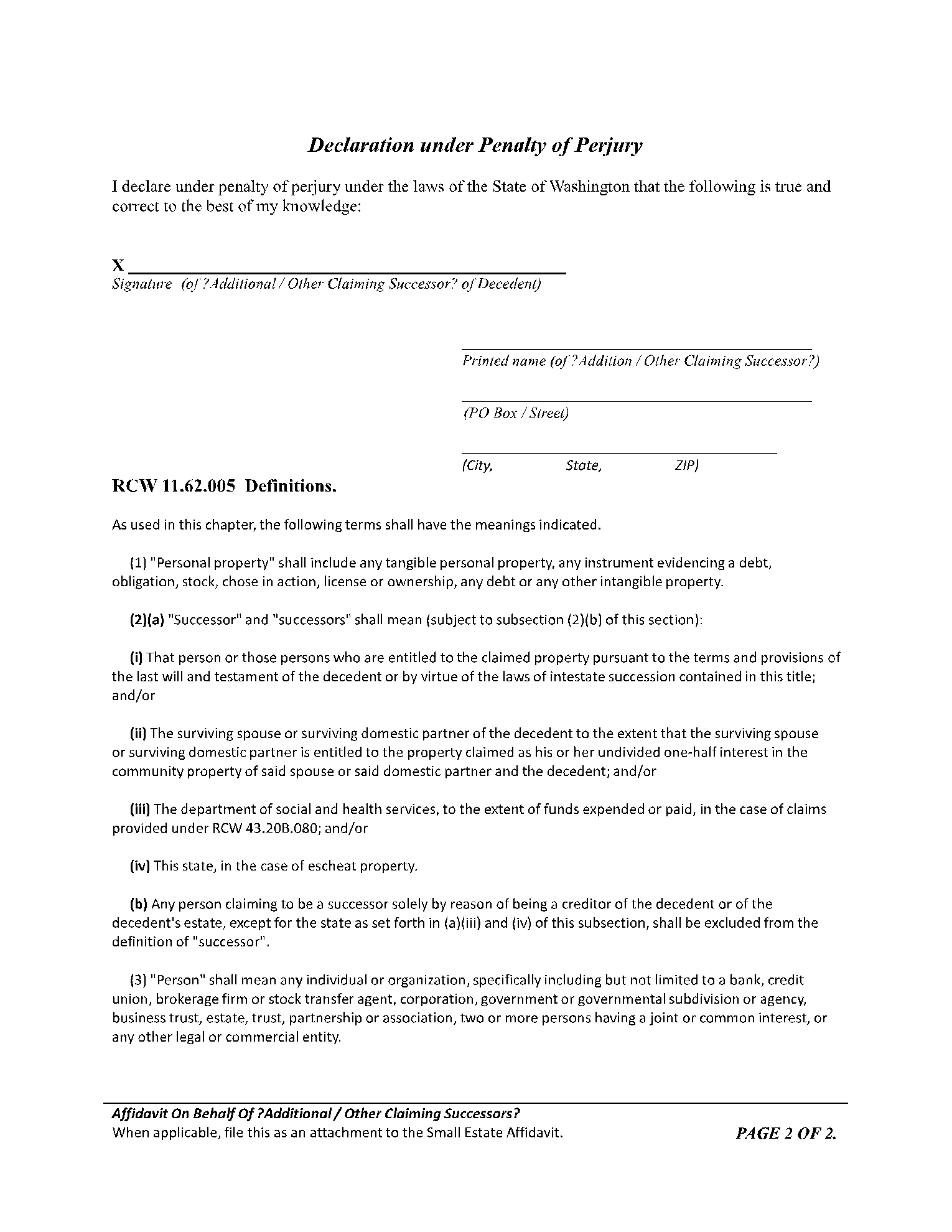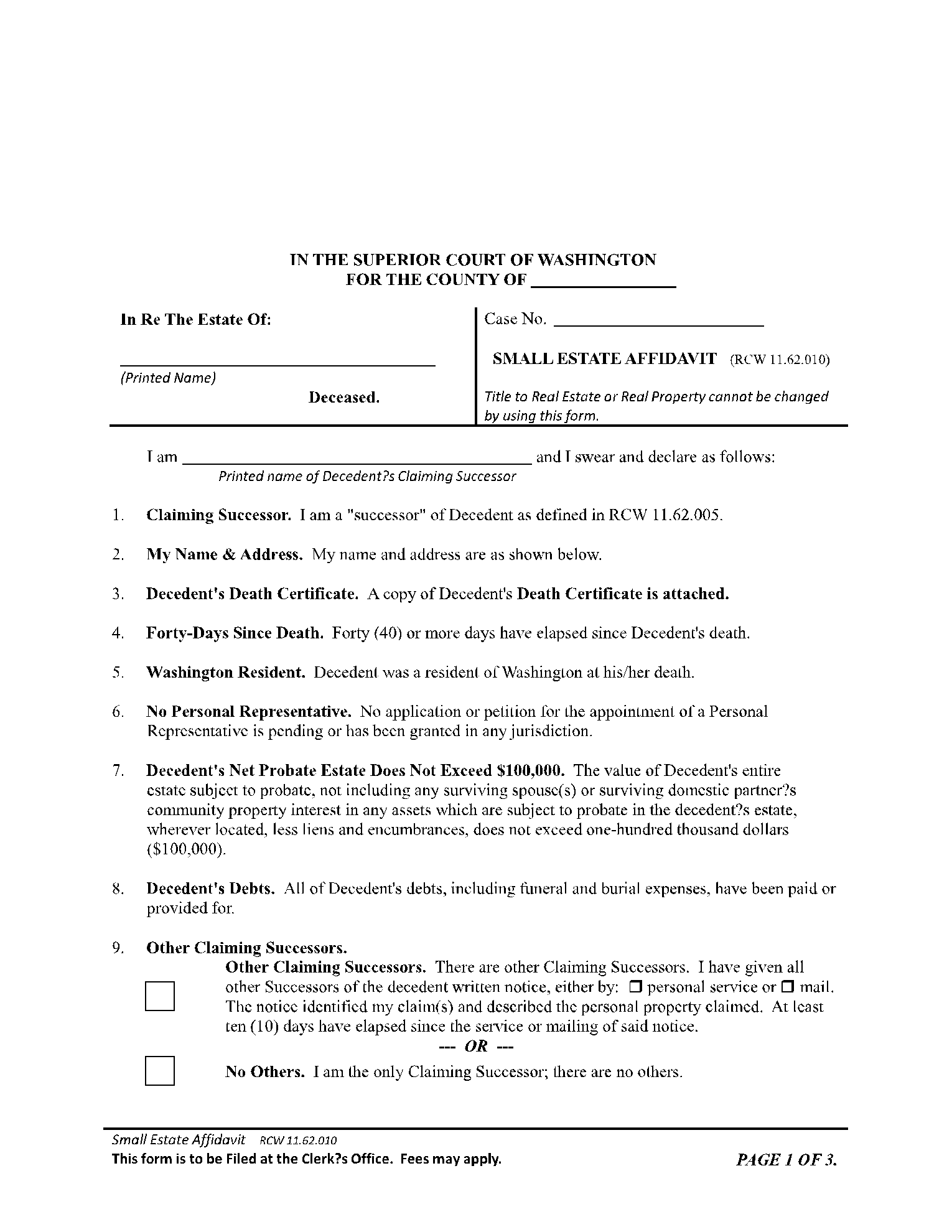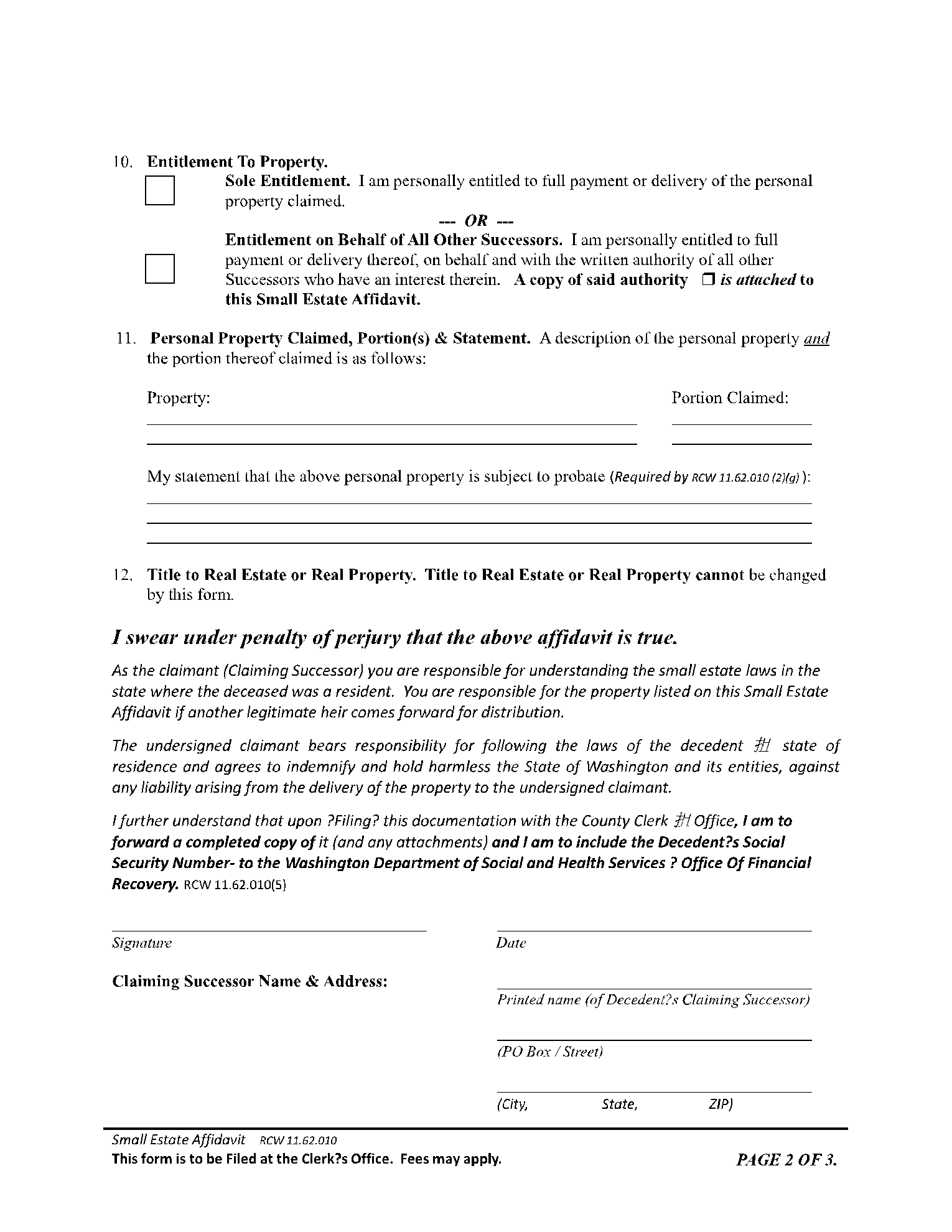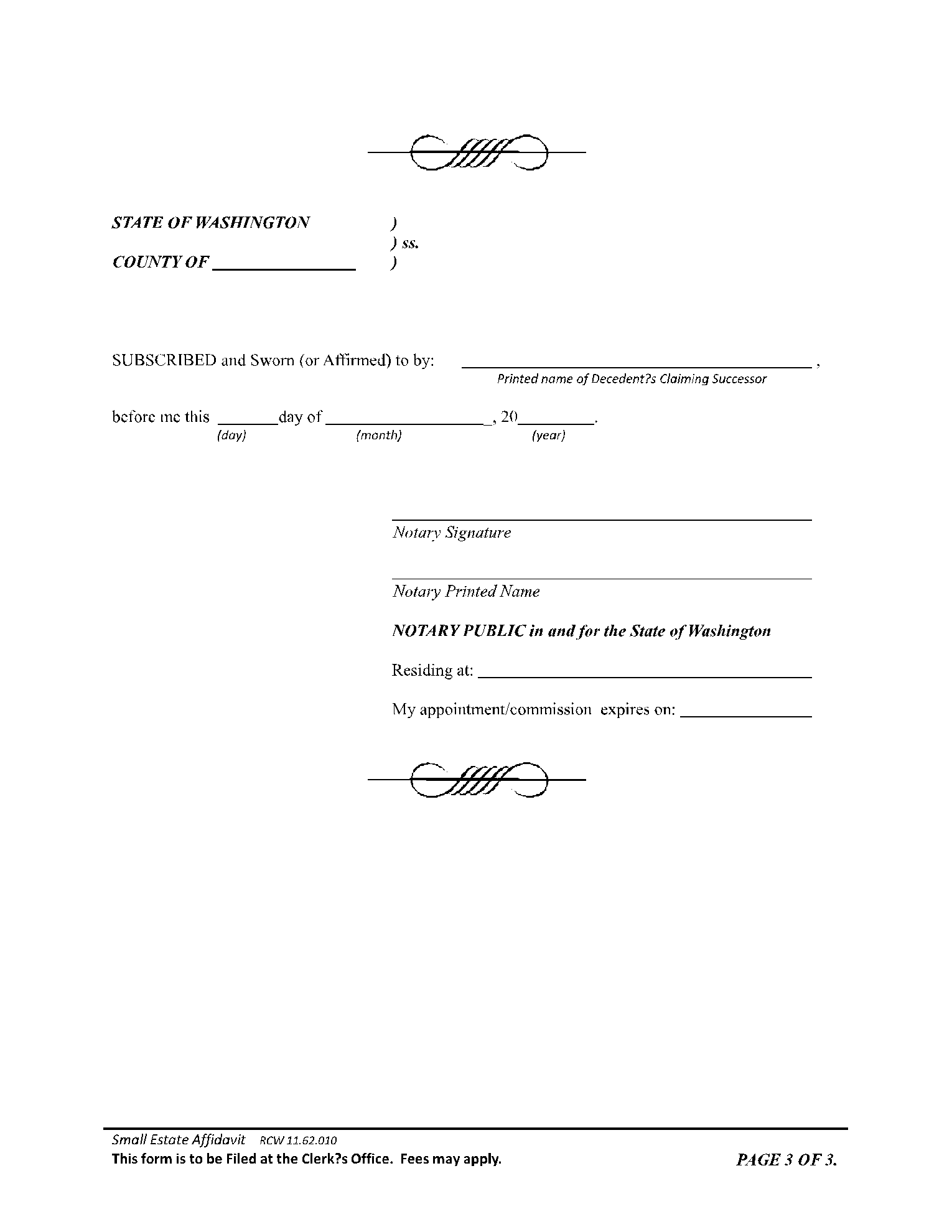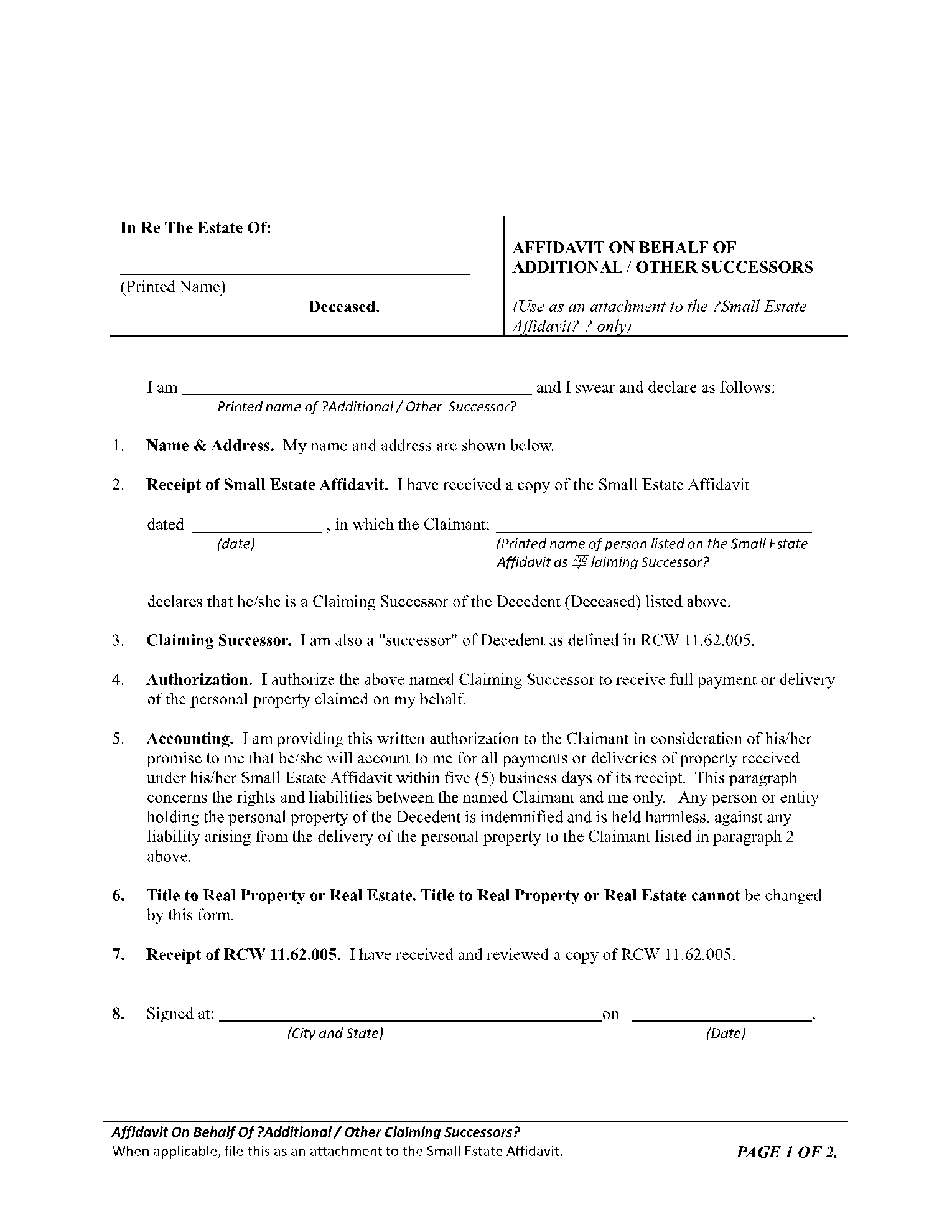In Washington, you may acquire small estate belonging to a decedent (deceased person), in qualifying cases, without probate proceedings with the small estate affidavit. Learn all about this procedure here. Alternatively, you can use our free small estate affidavit form above the page.
Here’s what should be included in your Washington small estate affidavit
-
- Name of Washington decedent
- Name of successor to the decedent
- Address of successor
- Description of Property to be claimed
- Reason for entitlement by successor
- Release to successor
- Date of claimant signature
- Claimant signature
- Notary action for Washington
What Is a Washington Small Estate Affidavit?
A Washington small estate affidavit is a document that allows you to acquire a decedent’s small estate without lengthy court proceedings. It’s applicable only if the assets in question are considered “small” – less than $100,000 in value in Washington.
Note that small estate affidavits aren’t always usable even if the value of the estate in question is less than $100,000. Further, if there is any real estate property owned, it gets added to the total evaluation. As such, it’s not always the best idea to use a small estate affidavit.
However, in the right cases, small estate affidavits allow you to avoid lengthy court proceedings and save a lot of time and money. With a small estate affidavit, you can request assets belonging to the deceased to be transferred over to you. The document can be shown to financial institutions and other holders.
When Can You Legally File for a Small Estate Affidavit?
The estate must be less than the value threshold of $100,000 in the state of Washington. Further, you must also meet the following conditions:
- You must be a successor to the small estate. If there is a will, you must be named a successor. If there is no will, you must qualify under the Washington law of intestate succession.
- Your decedent must have resided in the state.
- No personal representative or estate administrator has been appointed, and no proceedings to the effect are pending.
- You have seen all of the debts of the decedent, including the funeral and medical expenses.
- All other successors are aware of the small estate affidavit claim and have permitted you to acquire the estate.
- It has been 40 days since the person’s demise.
The affidavit must comply with the relevant laws in the Washington State Legislature. You don’t need to file this document in court.
Note that in some cases, the estate may qualify for simple probate proceedings instead. This is known as “settlement without court intervention”. Consult with a qualified attorney for more details.
What Is the Procedure for a Small Estate Affidavit in Washington?
After you have made sure you qualify for the small estate, you may begin composing the affidavit. The usual steps are outlined here:
- Compose the affidavit, and attach a death certificate.
- Sign and date it in front of a notary.
A copy of the affidavit must be sent to the DSHS (Office of Financial Recovery), along with the social security details. And you must wait 40 days after the decedent’s passing to use the document.
What Information Is Included in the Washington Small Estate Affidavit?
Make sure you comply with all the points outlined in Part 2 before composing the affidavit. Here are points of information to include in the small estate affidavit:
- The claimant’s name and address, and how they qualify as a successor.
- An affirmation that the decedent was living in the state of Washington.
- The value of the entire estate.
- No application or petition for a personal representative is granted or pending.
- All debts have been paid for.
- A description of the personal property or portion of the property claimed.
- All other successors have been notified.
- That the claimant is authorized by other successors to claim and distribute the property.
Refer to the RCW 11.62.005 for more details. You may also be required to file the original will if available.
Expert Recommendations
- Debts: Family members in Washington are not responsible for the debts of the deceased. But if you claim their small estate, then you assume responsibility for their debts. Make sure the value of the small estate exceeds the debts.
- Wages: If the decedent had unpaid wages, you may be able to receive them.
- Vehicles: You should use the Affidavit of Inheritance or Litigation to transfer vehicle ownership, instead of relying on the small estate affidavit. It’s more accepted.
- Tax refunds: You may qualify for a tax refund on the decedent’s behalf. Use the appropriate forms to file for it- Forms 1310 and 1040.
- Non-probate notice: This notice is optional, but gives you peace of mind. It’s sent to creditors.
Conclusion
When everything is clear and straightforward, you can compose the small estate affidavit without a hitch. If you foresee legal problems, get in touch with a lawyer.
You can use the free Washington Small Estate Affidavit form template here to compose the document in minutes. CocoSign offers a variety of legal forms and templates for free as well as provides other helpful resources.
